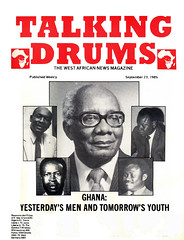What The Papers Say
National Concord, September 14, 1985
Reagan's sanctions: too little, too late
Last Monday, President Ronald Reagan, after extensive consultations with his key advisers, announced selective economic sanctions against the apartheid policies of South Africa. The sanctions included a ban on exports of computers to South African security organisations and on further sales of nuclear technology to the government.Predictably, some American and Western government officials have attempted to portray this admittedly limited action as a move in the right direction and as a warning to South Africa that sterner economic sanctions would be imposed if further reforms were not instituted.
What the announcement of these sanctions has done, however, is to exhibit the diplomatic prowess, sophistry and showmanship of the Reagan administration. More than this, it has shown the double standards with which the United States conducts its foreign policy.
American opposition to apartheid had risen to such a crescendo in recent months that the more liberal Congress was due to meet in a matter of weeks to pass what would have been more comprehensive economic and military sanctions against South Africa. And the Reagan administration had marshalled its forces in a consistent but ultimately ill-fated attempt to quell the progressive tide calling for sanctions.
When it became obvious that the attempt had indeed failed, President Reagan adroitly moved to nip the movement in the bud. As if the script had been dictated by a Hollywood movie director, the Republican-controlled Senate quickly announced the suspension of the earlier- scheduled vote on sanctions against both Poland and Nicaragua. Clearly, Mr Reagan does not believe in playing the game by one set of rules.
Apartheid, we believe, presents very clear and unambiguous moral and political choices. A country of 24 million white settlers blacks is being misruled by a tiny clique of four million . After attempting to gain their full political and economic rights through all manner of non-violence, the blacks have finally decided that the overthrow of Afrikanerdom must be by all means possible.
South Africa is now in a state of perpetual crises. The blacks refuse to be governed in this manner any longer. The collective and sincere imposition of comprehensive economic and military sanctions by the international community can certainly play a part in the dismantling of the apartheid regime. And President Kenneth Kaunda of Zambia has rightly warned that America and its allies would one day regret the violent upheaval that their stubborn and short- sighted policies are forcing upon South Africa.
Reagan's announcement of limited sanctions is therefore a clear indication that the United States is not ready to take a moral and long-term view of South Africa and, indeed, of Africa.
The Mirror, Ghana, September 7, 1985
Every week, a solidarity week
This past week has been observed in Ghana as a week of solidarity with the people's struggle in South Africa.The week actually began last week Friday when the men and women of the Armed Forces, their spouses and children, staged a big demonstration in Accra which culminated in the symbolic hanging of racist leader P.W. Botha at the Kwame Nkrumah Circle.
A member of the PNDC, Mrs Susan Al-Hassan spoke to the nation on radio and TV, reaffirming Ghana's commitment to the struggle for dignity of all oppressed peoples, the liberation and unity of the African continent and the abolition of all forms of racism.
During the week, there were several manifestations of support for the South African struggle including seminars, symposia, articles in the newspapers and discussions on radio and television. All these served to awaken the consciousness of Ghanaians to the struggle in South Africa which in several respects is actually a part of the global struggle against imperialism, colonialism, neo-colonialism and racism.
However it has been said in many quarters that a lot more could have been done within the week. There are also those who say that The Week was declared rather unexpectedly thereby preventing the manifestation of several forms of solidarity which would otherwise have been possible.
'The Mirror' whilst congratulating those who took part in these manifestations at the same time agrees that perhaps better preparations would have yielded a more massive response. In the opinion of "The Mirror' such a week of solidarity must be a national programme of activity that will entirely expose imperialism and racism and conscientize our people to our own history and the lessons to be drawn from it.
In particular our youth organisations, women's groups and other mass political and social organisations could have been activated to play a major role in the week. That this was not done is a cause for some regret, for, 'The Mirror' believes that there is abundant goodwill among our people for the millions of South Africa for whom the issue of the struggle has become a matter of life and death.
Such a week of solidarity gives ample opportunity for us to stress some important aspects of our own on-going process of political, social and economic transformation and thereby dray more people into the ranks of those who are prepared to say it loud that for Ghana it is motherland or death.
But we know that a missed opportunity is not necessarily a lost one. We should not end our solidarity with the week's ending. Indeed we must extend the week to cover all the coming weeks when in South Africa itself our brothers and sisters march up heroically to confront the apartheid monster. We should every day in every way express our support for those who stand up against the racist war machine.
We must make every week a week of solidarity, standing up on the side of those who will not lie down and be trampled upon by the weight of racism and apartheid.
Indeed, let every week be a solidarity week.
